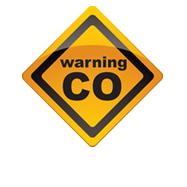Think carbon monoxide

The Public Health Agency is urging people to be vigilant for the signs and symptoms of carbon monoxide poisoning and recommends taking action to minimise possible risk.
Carbon monoxide poisoning can affect anyone. However, children, students, the elderly, pregnant women and anyone with heart or breathing problems are more vulnerable to its effects. Carbon monoxide is produced when fossil fuels such as gas, coal, oil, wood, petrol and paraffin burn without enough oxygen. It is a colourless, tasteless, odourless gas that is non-irritating.
Dr Anne Wilson, Consultant in Health Protection, Public Health Agency advised: “Carbon monoxide poisoning can be fatal and can also cause long-term health problems if victims are exposed to low doses over a long period of time. The signs and symptoms of carbon monoxide poisoning are often mistaken for other illnesses, such as food poisoning or flu – the symptoms can be similar to flu but without a raised temperature. Please look out for these signs and symptoms and consider if carbon monoxide poisoning could be the cause:
• headaches
• nausea and vomiting
• exhaustion
• drowsiness
• dizziness and lightheadedness
• ‘flu like’ symptoms
• palpitations (feeling your heart beat oddly)
• chest pain
• collapse without necessarily losing consciousness, followed by unconsciousness.
“Anyone who suspects they may be suffering from carbon monoxide poisoning should immediately turn off all appliances, go outside and seek medical help from a qualified healthcare professional. Appliances should not be used again until they have been serviced by a registered engineer.”
The Public Health Agency recommends the following actions to minimise the risk of carbon monoxide poisoning:
• install an audible Carbon Monoxide alarm that meets British or European standards (BS Kitemark or EN 50291). These cost as little as £20.00 and can be purchased from large DIY stores and food retail stores. Alarms however, should not be used as a substitute for regular servicing of appliances;
• sweep chimneys and flues every year if you use solid fuel;
• if you are in rented accommodation ask your landlord to provide you with an up-to-date gas safety record. This is a requirement by law and is particularly important for students renting houses and flats;
• keep flues, air vents and grilles clear and ensure rooms are well ventilated.
Contact the PHA press office on 028 9031 1611.
Northern Ireland Health and Safety Executive www.hseni.gov.uk/
Carbon monoxide. Are you at risk? DHSSPS. www.nidirect.gov.uk/8155_-_co_a5_leaflet_d16.pdf
For further information on carbon monoxide visit the Health and Safety Executive website www.hseni.gov.uk or the Health Protection Agency (England) website www.hpa.org.uk
